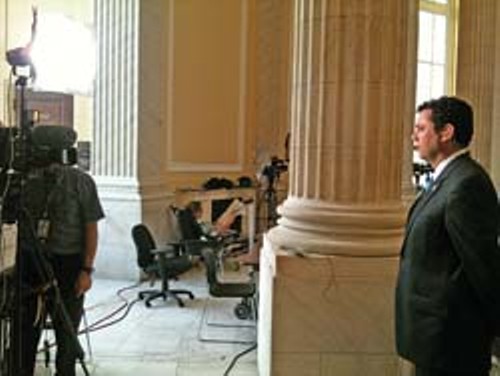It’s late spring in D.C., and the heat level is a slow Potomac bake. Utah 3rd District Congressman Jason Chaffetz enters his office after attending a joint session at the Capitol Rotunda to hear Israeli Prime Minister Benjamin Netanyahu speak. The scene outside was hectic, even for the nation’s capital: a half-dozen identical black SUVs waited, ready to squire away the Israeli entourage, and nearby security guards, looking bored, rested sweaty palms on the butts of their M16 machine guns. Protesters chanted across the street and lobbyists circled the Capitol like sharks.
At Constitution Avenue, a lobbyist in a black pinstripe suit joked about jaywalking as he and a colleague darted across the street. “Yeah, in D.C., laws are kind of a suggestion,” one says to the other, with a chuckle.
The Netanyahu visit has thrown off the congressman’s already jam-packed schedule by hours. Chaffetz’s pressing concern at the moment, however, is rats. The proximity his first-floor office has to the ground unfortunately makes it easy for vermin to get in. “The rats I usually deal with are wearing a tie,” Chaffetz says, flashing his Cheshire cat grin as he points out the traps he’s set around his office. All the while, a staff member is warning Chaffetz that visitors are waiting to see him.
Still, Chaffetz manages to sneak in an extra 10 seconds to show where his ballyhooed cot folds out and to point out with distress that he’s had to place mousetraps near his bathroom/changing room/closet. “That’s where I keep my undies,” he says with disgust before returning to his main office as groups begin filing in to bend his ear.
Spring in D.C. is the time when humidity mixes with politicking, spitfire idealism, salty cynicism and plain old-fashioned BS—bipartisan BS, at least. After two years as Utah’s newest congressional delegate, Chaffetz has acclimated to this sweltering environment. No longer a freshman but still a newcomer, Chaffetz has learned to manage a dizzying schedule of voting, making radio and TV spots and holding forth with a diverse constituency, many with their hands out. Chaffetz, as a rule, says no to federal spending projects, even when a prominent Utah road-construction company asks if thousands of out-of-work Utah construction workers justify a hard line in the Republican budget on transportation funding.
“That argument comes with no end,” Chaffetz counters with polite exasperation. “Of course, why don’t we spend 200 percent? Then everyone will be better. Maybe you’re not liking what you’re hearing here, but it’s the naked reality of what goes on in this building. This nation is bankrupt.”
He’s learned the ins and outs of the Capitol, the “People’s House.” He can navigate the labyrinth of tunnels that connect the House and Senate buildings like an underground city that includes cafeterias, travel agencies, gift shops and even a train. He’s learned to carry his own earpiece for TV interviews after once having to use Texas Republican Rep. Ron Paul’s less-than-clean one. “I learned that one the hard way,” Chaffetz says.
But while he knows his way around, being a new kid on the block is a role he clearly likes to play. And he might like to be a new kid on the Senate block if he could oust Republican Orrin Hatch, the 35-year Senate incumbent.
Jason Chaffetz was 9 years old in 1976 when Orrin Hatch first took office as a Utah senator. While freshman Hatch was learning the ropes and making a name for himself as a young conservative upstart, Chaffetz—like a typical 9-year-old—was entirely apolitical, nonreligious and unambitious—except when it came to kicking.
From the beginning, Chaffetz was running and kicking. He played soccer in Southern California youth leagues, dreaming of someday achieving Pelé-esque magnificence. Thirty-five years later, in his D.C. office, he fidgets with a football, a reminder of his kicking career for Brigham Young University.
For Chaffetz to take on Hatch—which insiders say is all but a given—will take skill and politics. For Chaffetz, it will mean sticking to a game plan that has taken him from soccer player to BYU Cougars placekicking record-holder to an incumbent-toppling, tea-party insurgent in D.C.
For some critics, Chaffetz’s affable—nay, goofy—laid-back charm is a veneer that covers an ambitious and opportunistic politician. Indeed, things have changed, and dramatically so, in the Chaffetz playbook—for example, his switching teams from his early days as a Dukakis Democrat to that of a tea-party Republican. And, for that matter, his conversion from an agnostic West Coaster to a member of The Church of Jesus Christ of Latter-day Saints.
“The most important thing I’ve found is just being humble enough to know that life as we know it is not just a big coincidence,” Chaffetz says. Critics who see Chaffetz as a right-wing extremist, or potential rivals like Hatch who see Chaffetz’s actions in line with the “far left,” also recognize in him a powerful drive—the kind that doesn’t happen by accident.
Chaffetz felt a call to the LDS faith early on, before he ever knew what a Mormon was. Before he undertook the grueling task of running for office, he learned a work ethic from a hard-working father, one who ran a strict household and one whom a childhood friend describes as a hard-nosed man seldom around in Chaffetz’s adolescence. He was a man who nevertheless encouraged Chaffetz to push himself through athletics, business and, perhaps, now to the office of the U.S. Senate. It’s the same drive that infuriates critics like blogger and one-time Independent challenger to Chaffetz in the 2010 election, Joseph Puente.
“We’re talking about a man who, years ago, registered the domain name ‘ChaffetzForSenate,’ ” Puente says. “He lives in a fantasy world where he’s win, win, win all the way.”
California Dreaming
Political consensus-building can be nauseatingly repetitious to watch as politicians condense complex ideas into tidy talking points. Chaffetz can hold his own, stating concise positions on Afghanistan, the debt ceiling, Medicare and other tough issues, boiled down to slogan-like simplicity. He even has a talking point about himself:
“I’ve always said, ‘So few people raise their hands,’” Chaffetz says. “‘And those who do make all the difference.’” Most every task he’s raised his hand for, he’s thrown himself into with manic gusto and an unrelenting discipline.
His earliest memories are of himself as a young tyke cruising on his family’s deck on his Big Wheel chased by his sheepdog named Socks. The Chaffetz household was often on the move in those days, thanks to the ever-changing business life of Jason’s father, John Chaffetz, who worked at a convertible dealership called the Little House of Hardtops and as a sports broadcaster for a local radio affiliate. By the time Jason was 9, the family had moved to Southern California, where his father had become a general partner—with Elton John as co-owner—of the Los Angeles Aztecs soccer team. The Chaffetz boys were given regular introductions to celebrities ranging from Rod Stewart to Bill Cosby. Jason’s godfather was Dodgers legend Sandy Koufax, a friend of John Chaffetz.
Harlan Glatt, a government employee in Southern California, recalls his double-take in 2009 when he spotted his childhood friend leg wrestling on Comedy Central’s The Colbert Report. “I got my brain twisted seeing him,” Glatt says, adding that he wasn’t too surprised. “He had all the makings of a Republican politician.” Glatt was a friend from junior high school who played soccer with Jason, hung out after school with him and went to a few Aztecs games with Jason and his father.
While Chaffetz describes his formative years as being a “skinny geek,” Glatt calls that “false modesty.”
“He cared very much about his popularity to the extreme,” Glatt says. “He cared what people thought about him all the time.”
Looking back now, Glatt says the arc of Chaffetz’s career matches the ambition he displayed back then. “He always wanted to be on the winning team,” Glatt says.
Glatt also remembers Jason’s father as a man known to bark orders. “He just wasn’t very friendly,” Glatt says. “It was always ‘tuck in your shirt,’ ‘tie your shoes.’” The other thing Glatt noticed about Chaffetz’ dad was his absence. “[Jason] always had a lot of Christmas gifts, there was always something to play with at his house. It could have been there was a lot of gifts because his dad was not present that much.” Chaffetz criticizes Glatt’s characterization of his homelife as an “11-year-old’s perspective.”
More by Eric S. Peterson
-
The Secret Sauce
How Utah lawmakers disclose—or don't disclose—conflicts of interest.
- Feb 14, 2024
-
Police departments in Salt Lake County spent almost $20 million on civil rights complaints in the past decade
The Co$t of Mi$conduct
- Oct 18, 2023
-
Women decry harassment and toxic culture at St. George auto dealership
Men at Work
- Oct 11, 2023
- More »
Latest in Cover Story
Readers also liked…
-
Forget the family pedigree—Robert F. Kennedy Jr should not be the next president of the United States
Trojan Horse
- Jun 21, 2023
-
Women decry harassment and toxic culture at St. George auto dealership
Men at Work
- Oct 11, 2023







